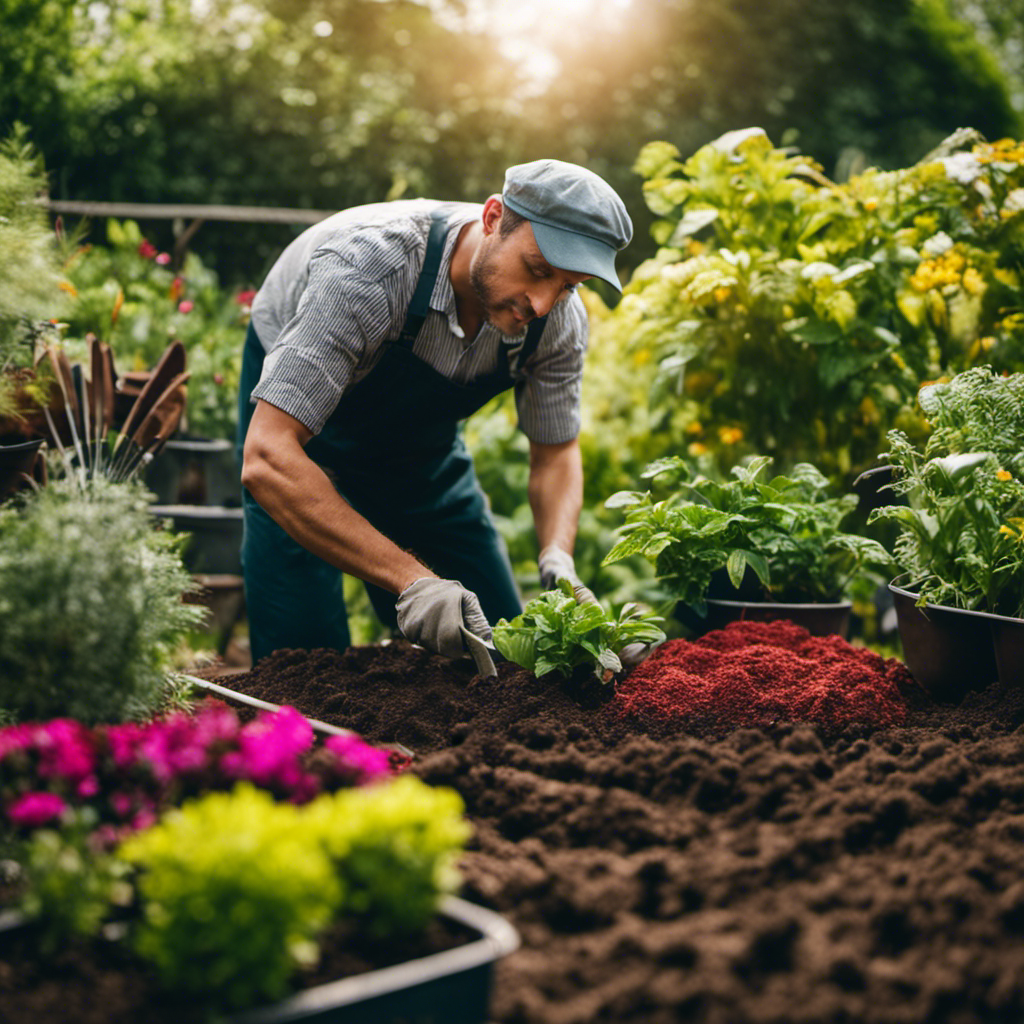Growing herbs for cooking and medicine is a practical way to bring fresh flavors and natural remedies into your daily routine. Whether you have a small garden or just a few containers, cultivating herbs like basil, mint, or lavender offers numerous benefits. But to truly succeed, you need to understand the best practices for planting, caring for, and preserving them. So, what steps will you take to turn your space into a thriving herb garden?
Key Takeaways
- Select versatile herbs like basil, rosemary, mint, and thyme suitable for both culinary and medicinal uses.
- Prepare well-draining, organic-rich soil and choose appropriate containers or garden beds for healthy growth.
- Propagate herbs through cuttings or seeds, ensuring proper watering and regular maintenance for vigorous plants.
- Harvest herbs in the morning, dry properly, and store in airtight containers to preserve flavor and medicinal properties.
- Incorporate herbs into daily routines for cooking and natural remedies, utilizing their therapeutic benefits effectively.
Selecting the Right Herbs for Your Space

Choosing the right herbs for your space begins with understanding your environment and how much sunlight, temperature, and space you have available. If you’re working with indoor space, consider herbs that thrive in lower light conditions, like mint or parsley.
Pay attention to sunlight requirements; some herbs need direct sunlight for several hours daily, while others prefer indirect light or partial shade. Assess your windows and available spots to match herbs with their light needs.
For small indoor spaces, compact herbs such as chives or basil can fit easily on windowsills or shelves. Properly matching your herbs’ sunlight requirements to your space ensures healthy growth and a successful herb garden. Additionally, understanding best soil for herbs can significantly improve your plants’ health and yield.
Essential Tools and Supplies for Herb Gardening

To start your herb garden, you’ll need essential tools like trowels, pruning shears, and watering cans. Choosing quality soil and fertilizers helps your herbs thrive. Container selection and proper lighting are key for healthy growth. Getting these supplies right sets a strong foundation for successful herb gardening. Additionally, selecting appropriate soil amendments can further enhance plant growth and vitality.
Essential Gardening Tools
Having the right tools makes herb gardening more enjoyable and successful. With essential tools, you can easily manage garden design and pest control, ensuring healthy, thriving herbs. A good pair of pruning shears helps shape plants and remove dead leaves, promoting growth. A hand trowel is perfect for planting and transplanting herbs. A watering can ensures consistent moisture, critical for herb health. Use the table below to see some key tools:
| Tool | Purpose |
|---|---|
| Pruning Shears | Trim and shape plants |
| Hand Trowel | Planting and transplanting |
| Watering Can | Maintain proper moisture |
| Garden Fork | Aerate soil, improve drainage |
These tools streamline garden design and pest control, making your herb garden more productive. Additionally, selecting the right tools can enhance Hyundai Tuning to improve your vehicle’s performance and handling.
Quality Soil and Fertilizers
Healthy herbs thrive in rich, well-draining soil that provides essential nutrients. To achieve this, start by improving your soil with organic fertilizers, which release nutrients slowly and promote healthy root development.
Incorporate soil amendments like compost or aged manure to enrich the soil’s organic matter and enhance its structure. These amendments improve drainage and aeration, preventing waterlogging and root rot. Vetted soil management practices ensure your herbs receive the optimal environment for growth.
Avoid synthetic fertilizers, as they can harm beneficial microbes and lead to nutrient imbalances. Regularly test your soil to monitor pH levels and nutrient content, adjusting with appropriate amendments as needed.
Healthy soil is the foundation of vigorous herb growth, ensuring your plants develop strong flavors and medicinal properties. Proper soil management makes a significant difference in your herb garden’s success and longevity.
Container and Lighting Needs
Choosing the right containers and providing adequate lighting are key steps to successful herb gardening, especially if you’re growing indoors or in limited space.
For container selection, opt for pots with drainage holes to prevent waterlogging. Use lightweight, breathable materials like terracotta or plastic for ease of handling.
When it comes to indoor lighting, guarantee your herbs get at least 6 hours of direct sunlight daily, or supplement with grow lights if natural light is limited.
Consider the following:
- Use containers with drainage
- Choose lightweight, breathable materials
- Place herbs near south-facing windows
- Install grow lights if needed
- Rotate containers for even light exposure
Proper container and indoor lighting setup helps your herbs thrive and stay healthy.
Best Practices for Planting and Propagating Herbs

To successfully grow herbs, start by preparing the soil with proper techniques like adding compost and ensuring good drainage. Using healthy soil conditions will promote stronger root development and overall plant health. Choose the best propagation methods, such as cuttings or seeds, based on each herb’s needs. Regular watering and maintenance will keep your herbs healthy and thriving.
Soil Preparation Techniques
Preparing the soil properly is essential for successful herb gardening, as it provides the foundation for strong root growth and healthy plants. Start by enriching your soil with suitable soil amendments to improve fertility and drainage. Testing your soil’s pH helps guarantee ideal growing conditions; most herbs prefer slightly acidic to neutral pH levels. To achieve this, you might add lime or sulfur for pH balancing. Incorporate organic matter like compost to boost nutrients and enhance soil structure. Remember to loosen the soil to prevent compaction, allowing roots to grow freely. Keep these tips in mind: – Use organic soil amendments like compost or aged manure – Test and adjust soil pH for herbs’ preferences – Incorporate organic matter for nutrients – Loosen soil for proper root development – Ensure good drainage to prevent root rot. Fokos also emphasizes the importance of testing and adjusting soil conditions to create an optimal environment for herbs.
Optimal Propagation Methods
Starting with healthy, vigorous plants or cuttings is key to successful herb propagation.
For root cuttings, choose mature, healthy roots, and plant them in well-draining soil, keeping the cuttings moist. This method works well for herbs like horseradish and mint.
Seed starting is another effective technique—sow seeds indoors or directly into prepared soil, following specific depth and spacing guidelines for each herb. Use fresh seeds for better germination rates, and keep the soil consistently moist.
Both methods require patience but yield strong, resilient plants if done correctly. Root cuttings promote faster growth, while seed starting allows for a broader variety.
Properly executed, these propagation techniques give you a solid foundation for a thriving herb garden.
Watering and Maintenance
Consistent watering is essential for healthy herb growth, but overwatering can lead to root rot and other issues. To maintain healthy plants, establish a reliable watering schedule based on the herb type and soil moisture. Proper color accuracy in your watering method can help ensure each herb receives the right amount of water without overdoing it. A good rule of thumb is to check the top inch of soil; if it feels dry, it’s time to water. Use a maintenance checklist to stay on top of your herbs’ needs: – Water early in the morning or late afternoon – Ensure proper drainage to prevent waterlogging – Mulch around plants to retain moisture – Remove dead or yellowing leaves regularly – Adjust watering frequency during hot or dry periods Following these practices helps your herbs thrive and guarantees a steady supply for cooking and medicine.
Caring for Your Herb Garden: Watering, Fertilizing, and Pruning

To keep your herb garden healthy and thriving, you need to pay close attention to watering, fertilizing, and pruning. Establish consistent watering schedules based on each herb’s needs—most herbs prefer moist, well-drained soil but avoid overwatering.
Check the soil regularly; if it feels dry a couple of inches below the surface, it’s time to water.
Use proper pruning techniques to promote healthy growth and prevent legginess; trim back stems just above a set of leaves, and remove any dead or yellowing foliage.
Fertilize sparingly with a balanced, organic fertilizer to encourage robust growth.
Optimal angles for pinball machines can influence gameplay performance and longevity, highlighting the importance of proper setup for an optimal gaming experience.
Regular attention to these practices guarantees your herbs stay vigorous, flavorful, and ready for culinary or medicinal use.
Common Challenges and How to Overcome Them

Even with proper care, herb gardens can face common problems like pests, diseases, and environmental stress.
To tackle pest control, regularly inspect your herbs and remove pests by hand or use natural remedies. Practicing herb rotation helps prevent soil-borne diseases and keeps pests from settling.
Here are some ways to overcome challenges:
- Rotate herbs yearly to reduce pest and disease buildup
- Use companion planting to deter pests naturally
- Keep the garden clean to prevent disease spread
- Improve air circulation to reduce fungal issues
- Water early in the day to avoid excess moisture
- Consider sustainable farming practices to enhance plant health and resilience.
Harvesting and Preserving Your Herbs

Harvesting herbs at the right time guarantees you get the freshest flavor and highest potency. Pick herbs in the morning after dew has dried for the best essential oil content. Using a carbohydrate counter can help you monitor your intake if you’re incorporating herbs into a low carb or keto diet. To preserve your harvest, use effective techniques like herb drying, which involves hanging herbs upside down in a warm, dry, well-ventilated area. Alternatively, you can speed up the process with a food dehydrator or oven set to low heat. Once dried, store herbs in airtight containers away from sunlight to maintain flavor and potency. Proper preserving techniques prevent mold and loss of essential oils, ensuring your herbs stay potent for months. Whether drying or freezing, always label your herbs clearly to keep track of freshness and best usage times.
Culinary Uses of Fresh Herbs

Fresh herbs can transform any dish with their vibrant flavors and aromatic qualities. Knowing herb flavor profiles helps you enhance your cooking, creating balanced and delicious meals.
Use basil for a sweet, peppery note in salads or pasta, and pair rosemary with roasted meats for a fragrant touch. Cilantro adds a fresh, citrusy brightness to Mexican or Asian dishes, while mint provides coolness in beverages and desserts.
Thyme’s earthy tones work well in stews, and dill’s tangy flavor complements fish and potatoes. When considering culinary pairing, think about the herb’s strength—use milder herbs like parsley for garnishes, and stronger ones like oregano for hearty dishes.
Experiment with these combinations to elevate your cooking and bring out the best in your herbs.
Medicinal Benefits and Natural Remedies From Herbs

Herbs have been valued for their medicinal properties for centuries, offering natural remedies for a variety of health concerns. You can create herbal tinctures by steeping herbs in alcohol or glycerin, making concentrated extracts for easy use. These tinctures help treat issues like stress, inflammation, and digestive problems.
Additionally, herbs are widely used in aromatherapy applications, where essential oils from herbs like lavender or peppermint promote relaxation and relieve headaches. Incorporating herbs into your daily routine can boost your well-being naturally.
Whether you choose tinctures for internal use or aromatherapy to enhance your environment, these herbal remedies provide effective, accessible options for promoting health. Embrace the healing power of herbs and explore their benefits to support your overall wellness.
Frequently Asked Questions
Can I Grow Herbs Indoors Year-Round?
You can grow herbs indoors year-round with the right setup. Use indoor lighting solutions like grow lights to guarantee your herbs get enough light, especially in winter.
Decide between soil versus hydroponics; soil is simple and affordable, while hydroponics offers faster growth and better control.
Keep your herbs in well-draining soil or a hydroponic system, and monitor light, water, and temperature to keep them healthy year-round.
Which Herbs Repel Pests Naturally?
Ever wonder how to keep pests at bay naturally? You can harness the power of herbs with pest-repelling qualities through companion planting. Herbs like basil, mint, and marigolds act as natural repellents, deterring pesky insects without chemicals.
Plant them near your vulnerable crops or indoors to create a protective barrier. These herbs not only add flavor but also serve as guardians, making your garden a pest-free sanctuary.
How Do I Extend Herb Shelf Life?
To extend your herb shelf life, focus on herb preservation methods like drying techniques. You can hang herbs upside down in a well-ventilated space or use a dehydrator to speed up drying.
Once dried, store herbs in airtight containers away from sunlight to maintain freshness and potency. Proper drying and storage help keep your herbs flavorful and aromatic longer, ensuring you enjoy their benefits well beyond harvest time.
Are Organic Herbs More Potent Medicinally?
When comparing organic vs conventional herbs, you might wonder if organic herbs are more potent medicinally. Organic herbs often have higher herb potency because they’re grown without synthetic chemicals, allowing their natural compounds to develop fully.
This can enhance their medicinal effects. However, potency also depends on factors like harvest time and storage. So, choosing organic herbs can sometimes give you more robust medicinal benefits, but quality and freshness matter too.
Can Herbs Be Grown Hydroponically at Home?
Think of your home as a lush garden in a glass jar, where herbs thrive without soil. Yes, you can grow herbs hydroponically at home.
You’ll need proper hydroponic nutrition and vigilant root zone management to keep plants healthy. With steady care, you’ll create a thriving, soil-free herb garden indoors, enjoying fresh flavors and medicinal benefits right from your own space.
Conclusion
With a little effort, your herb garden can become your personal oasis of flavor and wellness, transforming everyday meals and health routines. By choosing the right herbs, caring for them properly, and preserving their magic, you’ll unearth nature’s most powerful secrets right at your doorstep. Remember, your garden isn’t just a patch of dirt—it’s a gateway to culinary delights and natural remedies that can elevate your life beyond imagination. Happy gardening!











